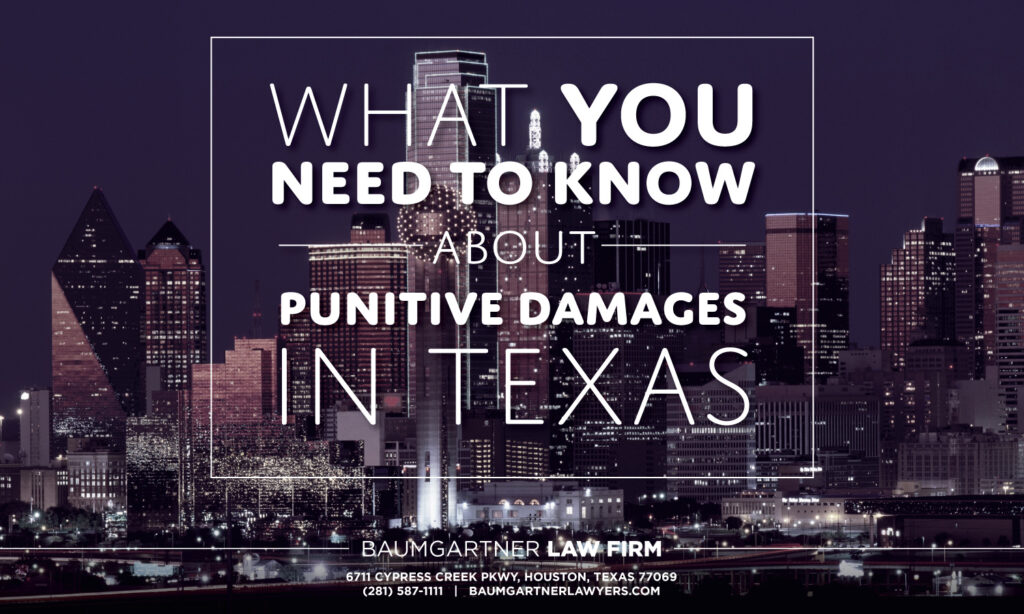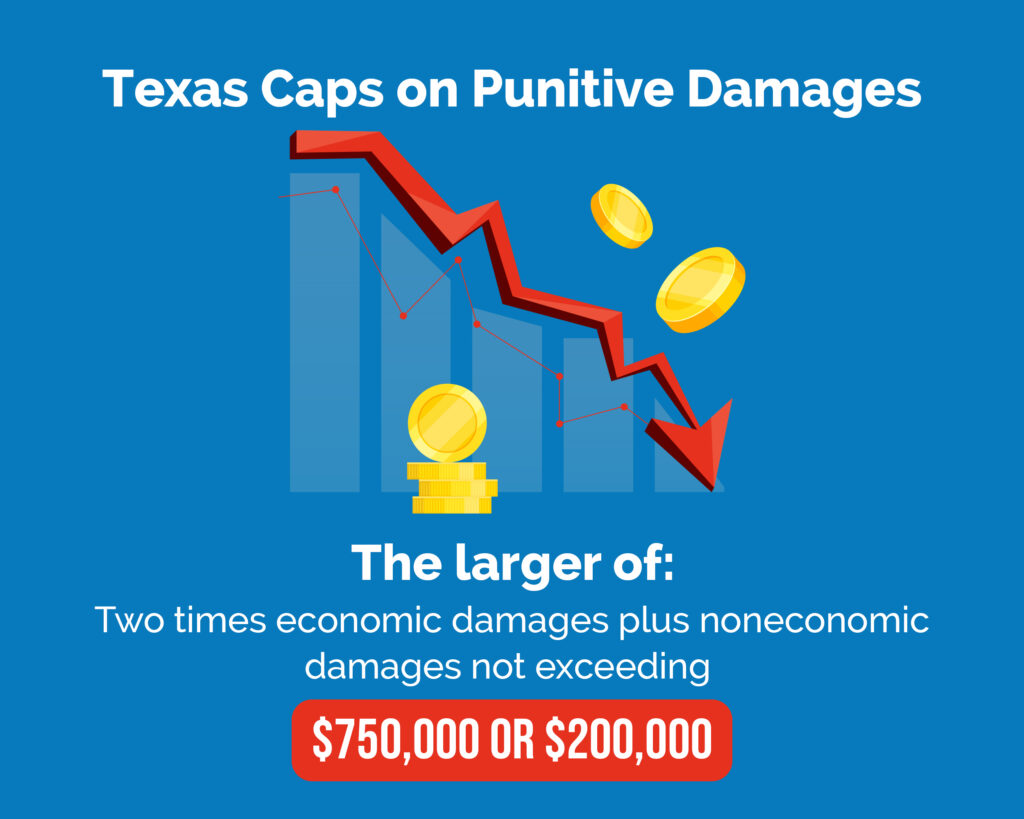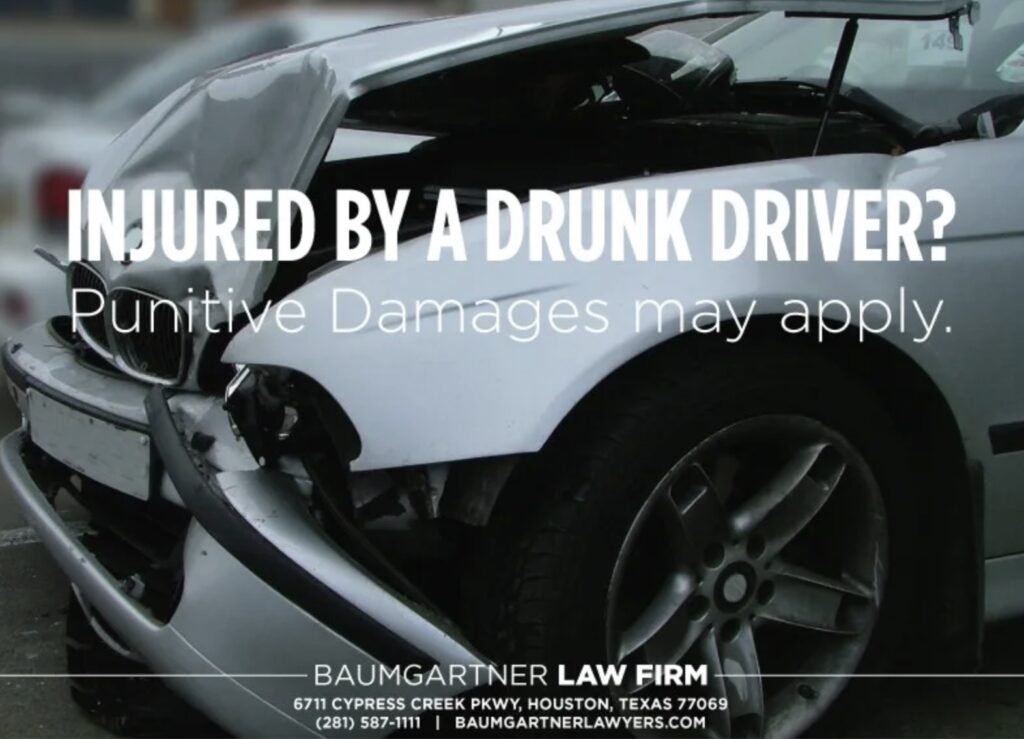Punitive damages, also called exemplary damages, are extra money that a defendant might have to pay if they caused harm on purpose or by being very reckless. These damages are meant to punish the defendant and stop others from doing the same thing. They are not meant to help the victim directly.

Texas Punitive Damages Summary
In Texas, punitive damages (also called exemplary damages) are legal punishments for very bad behavior or gross negligence.
– The amount of punitive damages depends on how bad the defendant’s actions were and how much money they have. In Texas, there is a legal limit on how much can be awarded.
– Lawyers who specialize in punitive damages help gather evidence and prove that the defendant acted intentionally or recklessly.
When Are Exemplary Damages Awarded in Texas Personal Injury Cases?
Exemplary damages are extra penalties given to punish wrongdoers and stop others from doing the same bad things. In Texas personal injury cases, these damages are given to penalize severe misconduct, not just to compensate the victim.
In Texas, to receive exemplary damages, the plaintiff must show clear proof that their injuries were caused by actions involving fraud, malice, or gross negligence.
A unanimous jury decision is usually needed for awarding exemplary damages, meaning all jurors must agree on the defendant’s responsibility and the amount of compensatory damages.
Situations that may lead to exemplary damages include:
– Dangerous vehicle designs by manufacturers
– Construction companies using poor practices
– Severe harm from intentional violation of safety rules
– Commercial truck accidents with willful safety issues
The Purpose of Punitive Damages
In Texas civil practice, punitive damages are available to those injured due to gross negligence or malicious intent. Unlike most personal injury claims in the state, which typically involve compensatory damages, punitive awards provide an avenue for penalizing and discouraging egregious conduct.
To receive this type of award, plaintiffs must show proof that their harms were caused by fraudulence, malice, or extreme carelessness on behalf of the defendant. With strict standards around awarding these types of damages—and with punishments intended chiefly to serve deterrence purposes—punitive damage cases remain rare occurrences within legal proceedings throughout Texas.
What are the Basics of Personal Injury Damages in Texas?
Personal injury damages in Texas encompass two main categories: compensatory and exemplary damages. Compensatory damages aim to compensate the injured party fully and include various economic and non-economic components such as medical expenses, lost wages, pain and suffering, physical impairment, rehabilitation costs, and more.
On the other hand, exemplary damages, also known as punitive damages, are awarded in exceptional cases as a form of punishment towards the at-fault party and as a deterrent against similar misconduct in the future. While compensatory damages strive to make the plaintiff whole, exemplary damages are imposed to penalize egregious behavior and discourage its recurrence.
It’s important to note that exemplary damages are not granted in every case and their availability is restricted by both state laws and judicial rulings.
What are the Requirments for Winning Exemplary Damages in Texas
In Texas personal injury cases, punitive damages can be awarded after establishing that the defendant has acted with gross negligence, malice, or fraud.
To obtain these penalties in a lawsuit involving such an issue, the plaintiff’s case must get a unanimous jury verdict, as this standard of proof ensures that justice will only be served if their conduct warrants punishment.
Criteria for Proving Gross Negligence
Gross negligence is an extreme neglect of duty that is likely to harm others. It involves the actor knowing, or being subjectively aware of, the hazardous risks present and still proceeding without considering any repercussions on the safety, rights, or welfare of other parties.
To prove gross negligence in court proceedings, the evidence must show how the person – either by their words/statements made beforehand, actions taken before, or what they were personally familiar with regarding the risks with the conduct.
Evidence could be inferred from a lack of corrective measures even after learning about such dangers and disregarding accepted rules meant for protection and warnings if any were issued prior!
Proving Malice or Fraud
To prove malice or fraud, it must be established that the defendant acted with a specific intent to cause significant harm. This refers to an intentional effort by the defender to inflict damage on another person.
For punitive damages cases in Texas, proof of this type of intentionality, such as documentation showing any malicious behavior conducted deliberately by the accused individual, is needed. A routine car accident without other factors, like drinking or loaning a vehicle to a person you know is drunk, does not merit punitive damages.
Proof of malice or fraud can come in many forms, including sworn testimony, documents, witness accounts, and investigations.
What is the Legal Process for Pursuing Punitive Damages in Texas
When seeking punitive damages in Texas, a high burden of proof must be met, and the jury’s decision must be unanimous. The plaintiff must prove their case by providing enough evidence for compensatory damages awards.
A defendant can ask the court to bifurcate the case or split the case into two parts. Part one is the liability for the case, and part two is the questions about punitive damages and amount. Bifurcation is a strategy that seeks to keep a jury from hearing some evidence when determining actual or compensatory damages.
The Burden of Proof in Texas: Clear and Convincing Evidence
Under the Texas legal system, an individual must prove with certainty that another party has committed gross negligence or intentional fraud to secure punitive damages.
This requires clear and convincing evidence that demonstrates fault on behalf of the defendant beyond any reasonable doubt. Punitive damages are not easy to attain. As per Texas law, only if sufficient proof can be provided will such an award be upheld.
Unanimous Jury Verdict Requirement
In Texas, punitive damages are only awarded if all jurors reach a unanimous verdict. This prevents arbitrary or unreasonable amounts from being charged and indicates that all the jury members agree on the defendant’s culpability.
The unanimity requirement provides extra protection against excessive punishment in civil cases. This process preserves fairness when it comes to awarding punitive damages throughout Texas.
The Awards are Limited to the Defendant
Section 41.006 requires any award of exemplary or punitive damages must be specific against a defendant. In other words, in a multiple party case, only the defendant guilty of acts subject to liability for punitive damages has to pay those damages. There is no joint and several liability for exemplary damages in Texas.
Factors Affecting the Amount of Punitive Damages Awarded
When assessing the punitive damages allocated in Texas, elements like the graveness of the defendant’s behavior and financial situation are considered. The Texas Supreme Court strives to ensure that the penalties awarded match what they have done and have the desired effect. By evaluating such factors, they aim to guarantee that the punishments given out are proportionate.
Severity of Defendant’s Conduct
The amount of punitive damages given in Texas is determined by the degree to which a defendant’s misconduct was severe. The court considers numerous factors, such as intentionality and reckless behavior, when evaluating how grave their action might have been alongside any harm caused to the plaintiff.
Defendant’s Financial Status
To ensure that the awarded punitive damages are fair and effective, the court considers all aspects of a defendant’s financial situation. Doing so helps guarantee that judgment is handed down by providing penalties proportionate to available resources while retaining its essential purpose – deterring malicious behavior from occurring again in future cases.
Are There Caps on Punitive Damages in Texas?

Yes, In Texas, caps on punitive damages are determined by law with some exclusions. Punitive damages cannot exceed the greater of two times the economic damages or losses plus the noneconomic damages not exceeding $750,000 or $200,000.
There are specific exceptions to the caps on punitive damages awarded in Texas covered under Section 41.008 (c)
. Those exceptions to the caps are mainly for criminal acts, such as sexual assault, intoxication assault, intoxication manslaughter, and other severe acts.
The Role of Personal Injury Attorneys in Pursuing Punitive Damages in Texas
Personal injury lawyers are vital in achieving punitive damages by assessing the case’s worth, amassing evidence, and constructing a convincing argument to pursue said punishment. They also facilitate settlement negotiations through their legal expertise.
If credible, the threat of a punitive damage award helps the personal injury lawyer negotiate for full damages and justice in the case.
Gathering Evidence
Attorneys must find clear and compelling evidence to satisfy the burden of proof for punitive damages. They employ numerous strategies, such as comprehensive investigations, expert testimony, and locating relevant documentation related to a case that serves as backing material for this specific type of damage award.
All these help build up enough persuasive data to make successful claims for plaintiffs who have experienced personal injury claims or incurred costs due to reckless behavior from another party with intentions beyond any normal foreseeable harm.
Negotiating Settlements
Skilled personal injury attorneys can leverage their negotiation abilities to ensure that their clients get the best possible outcome, including seeking punitive damages when applicable. They work diligently to obtain maximum compensation from a settlement.
Exemplary Damages Are Rare in Texas but Attainable
In Texas personal injury cases, punitive damages punish defendants for their gross negligence or malicious acts and deter any future similar behavior. The standards for getting punitive or exemplary damages are strict, yet for especially reckless or criminal behavior, one can get punitive damages in Texas.
According to a recent study, punitive damages are awarded in less than 5% of all Texas personal injury cases.
Punitive Damages in Texas FAQ
What are examples of punitive damages in a Texas personal injury case?

One easy-to-understand example of reckless conduct or gross negligence is an adult becoming highly intoxicated and causing an accident that injures innocent people. Punitive damages are often sought after a DUI or DWI accident with injuries.

Another example is when a trucking company puts an out-of-service semi on the road, knowing it is dangerous and the rig’s condition causes a truck accident.
A construction company knowingly does not provide required fall protection, and a worker falls to their death.
A landlord leases a place knowing the smoke detectors are inoperable and a fire badly burns a victim. The list of personal injury situations where exemplary damages are possible is long, and the common denominator is willful and reckless conduct that causes the injury.
What justifies punitive damages in Texas?
Punitive damages are given out as punishment for defendants whose conduct can be seen to be grossly negligent, intentional, or malicious. These payments act as a deterrent against the specific defendant repeating their actions and prevent other potential parties from committing similar offenses.
What is the burden of proof for punitive damages?
The plaintiff must provide “clear and convincing” evidence to prove that punitive damages should be awarded.
What is the main purpose of punitive damages in Texas?
In Texas, punitive damages are imposed to deter the offensive conduct. They act as a deterrent to prevent gross negligence or malicious behavior by those who have committed wrongdoings through such conduct or others by example. Thus, these monetary sanctions sanction and punish individuals and deter others from similar actions to protect our community.
Contact the Punitive Damage Lawyer at Baumgartner Law Firm for Help
Call the preeminent rated Houston personal injury lawyer at Baumgartner Law Firm at (281) 587-1111 for a free case evaluation, or text us by chat below.
6711 Cypress Creek Pkwy, Houston, TX, 77069
Related Resources:
WHAT IS THE AVERAGE SETTLEMENT FOR A DRUNK DRIVER CASE?
How Much Can You Sue for Personal Injury in Texas?
Maximizing Your Car Accident Compensation Claim in Houston, TX
Baumgartner Law Firm Practice Pages:
About Our Law Firm
Baumgartner Law Firm is a Houston personal injury law firm headed by Greg Baumgartner.
Our firm was established in 1985 and has helped thousands of injury victims get maximum compensation for their cases. If you have been injured in an accident in Houston, TX, contact us for a free, no-obligation consultation. (281) 587-1111.
Helping these areas around Houston
Houston, Sugar Land, Conroe, The Woodlands, Cypress, Spring, Atascocita, Kingwood, Humble, Katy and Tomball.

